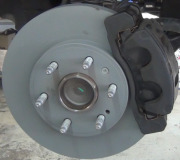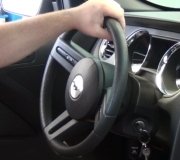Hi havemercy. Welcome to the forum. A number of things can cause a locking brake. Dirt and corrosion buildup on the polished sealing surface of a caliper piston prevents the piston from releasing. Years ago we cleaned or replaced the piston, but today it's just as inexpensive to replace the entire caliper. That's wat was done already and is the most common cause of locking brakes.
Brake fluid contaminated with petroleum products will make rubber parts soft and mushy. They will grow causing return ports in the reservoir to become blocked. The trapped fluid will keep the brakes applied. Then, as the brakes heat up, the trapped brake fluid heats up and expands, causing the brakes to apply harder. If the fluid is contaminated, the rubber seals under the reservoir cap will balloon up and you won't be able to stuff them back in. Opening a bleeder screw will release the trapped fluid and the brake. Your mechanic would have noticed this when he filled the fluid.
Another possibility that seems to becoming more common is a rubber front brake hose that's pinched off by rust buildup inside the crimp of the metal bracket holding the center of the hose. The brake will also release under this condition if the bleeder screw is opened. The fix is to open the crimp a little with a channel lock pliers. Replacing the hose, of course, will also solve the problem.
You are likely to find the car will move easily hours later after the trapped brake fluid has had a chance to work its way back up to the reservoir. The brake will lock up again after it's applied the next time. The big clue here is the brake will not release when a steel line is loosened at the master cylinder, but it will release when the bleeder screw is opened.
Caradiodoc
Sunday, February 21st, 2021 AT 1:15 PM



